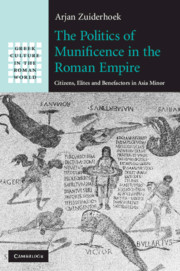Book contents
- Frontmatter
- Contents
- List of maps, tables and figures
- Acknowledgements
- List of abbreviations
- Roman Asia Minor
- Introduction
- 1 Introducing euergetism: questions, definitions and data
- 2 The size and nature of gifts
- 3 The icing on the cake?
- 4 The concentration of wealth and power
- 5 The politics of public generosity
- 6 Giving for a return: generosity and legitimation
- Epilogue: The decline of civic munificence
- Appendix 1 List of source references for the benefactions assembled in the database
- Appendix 2 Capital sums for foundations in the Roman east (c. i–iii ad)
- Appendix 3 Public buildings, distributions, and games and festivals per century (N = 399)
- Bibliography
- Index
Epilogue: The decline of civic munificence
Published online by Cambridge University Press: 15 July 2009
- Frontmatter
- Contents
- List of maps, tables and figures
- Acknowledgements
- List of abbreviations
- Roman Asia Minor
- Introduction
- 1 Introducing euergetism: questions, definitions and data
- 2 The size and nature of gifts
- 3 The icing on the cake?
- 4 The concentration of wealth and power
- 5 The politics of public generosity
- 6 Giving for a return: generosity and legitimation
- Epilogue: The decline of civic munificence
- Appendix 1 List of source references for the benefactions assembled in the database
- Appendix 2 Capital sums for foundations in the Roman east (c. i–iii ad)
- Appendix 3 Public buildings, distributions, and games and festivals per century (N = 399)
- Bibliography
- Index
Summary
During the course of this study we have primarily discussed the unprecedented rise in the number of civic benefactions during the second century ad, and the reasons that may lie behind this trend. We saw that, in a context of increasing oligarchisation and growing disparities of wealth within the citizenry (due to a rapid, vast and sustained rise of elite incomes), euergetism tended to underwrite the continuing importance of the citizen status of the non-elite members of the civic community, and the entitlements this status entailed. At the same time, analysis of the honorific discourse found in inscriptions, and of the public rituals of praise in which the non-elite citizenry expressed their gratitude to generous elite members, reveals that euergetism contributed in important ways to the legitimation of the oligarchic political system in the cities.
While discussing all this, however, we have mainly been talking about roughly the left half of Fig. 1.2 (see Chapter 1, p. 18), the graph that gave us the chronology of the rise and decline of euergetism in Roman Asia Minor. It is however in the right half of that same graph that we are confronted with a trend that is in many ways as fascinating as the second-century boom in munificence, and that is the sharp decline in the number of recorded benefactions from the 220s ad onwards. How to account for this seemingly fundamental change?
- Type
- Chapter
- Information
- The Politics of Munificence in the Roman EmpireCitizens, Elites and Benefactors in Asia Minor, pp. 154 - 159Publisher: Cambridge University PressPrint publication year: 2009



